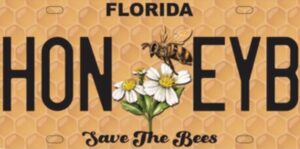 The State of Florida is giving car owners a special opportunity to help save the bees by pre-ordering a license plate! The annual use fees from the sale of the Florida State Beekeepers license plate will be distributed to the Florida State Beekeepers Association. The money will be put towards funding outreach and education to raise awareness of the importance of beekeeping to Florida agriculture. Additionally, the funds will help honeybee research and husbandry. The State has until October 2022 to get 3,000 pre-orders for the license plate to become a reality. Please pre-order yours today at the following link for $40: https://myfloridaspecialtyplate.com/beesvoucherorder.html
The State of Florida is giving car owners a special opportunity to help save the bees by pre-ordering a license plate! The annual use fees from the sale of the Florida State Beekeepers license plate will be distributed to the Florida State Beekeepers Association. The money will be put towards funding outreach and education to raise awareness of the importance of beekeeping to Florida agriculture. Additionally, the funds will help honeybee research and husbandry. The State has until October 2022 to get 3,000 pre-orders for the license plate to become a reality. Please pre-order yours today at the following link for $40: https://myfloridaspecialtyplate.com/beesvoucherorder.html
Category: Wildlife
News about Torreya State Park
The Florida Department of Environmental Protection (DEP) recently announced that Torreya State Park has been designated a State Geological Site. The agency describes State Geological Sites as “areas the Florida Geological Survey has determined to be significant to scientific study and the public’s understanding of Florida’s geological history.” source This is especially important for Torreya as the park is still in recovery from Hurricane Michael, and State Geological Sites receive more support and interest.
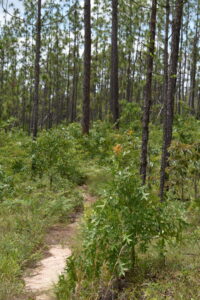
The agency explained that “Torreya State Park was chosen for this designation in part because of the park’s Rock Bluff, a steep, tall, limestone bluff that has been exposed by erosion from the Apalachicola River. Rock Bluff is part of the Torreya Formation and is about 18 million years old. Marine fossils (…) are found in the limestone formations exposed along the Apalachicola River and in the streambeds within the park.”
Leave the Leaves to the Bees!
Did you know that Florida is home to more than 300 species of bees?! In Florida, bees are active most of the year and rely on a variety of nesting materials to stay alive and reproduce. They may nest in well-drained soil that is sparsely vegetated, in trees or other wood, plants with hollow stems, or under fallen leaves. It is important to leave fallen leaves where they land in order to protect bee habitats, as well as help renourish the soil with nutrients from the decaying leaves.
It is incredibly important to help bees – and other insects – because they pollinate over 80% of flowering plants and food crops. The impact of bees’ hard work is seen very clearly here in the Panhandle, a notoriously agriculture-heavy area. If you would like to further assist the hard-working pollinators in your area, consider planting native wildflowers to help feed them and shelter them. Not only will you be helping the natural world but you will also get some beautiful flowers to enjoy! Click on the image below to view a list of wildflowers. 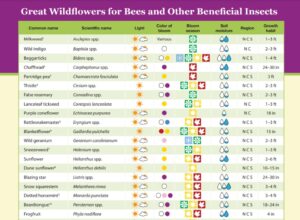
Bay County Audobon Society: Local Field Trip
Today at 7:30am, there will be a local field trip held at Majette Park by the Bay County Audobon Society. Interested in birding? Native plants? Photography? Just getting out and stretching your legs? This field trip has something for everything!
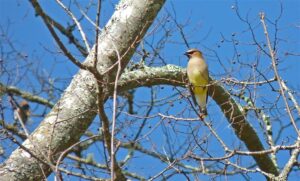
Please note that trips are subject to weather and last-minute changes. Additionally, due to COVID, facemasks are recommended while in close contact but may be removed once members spread out more than 6 feet during the walk. See their Facebook page, electronic newsletter, or Meetup page for up-to-date information; alternatively, call Ron Houser at 850-774-9733.
PCB Conservation Park Birding
 Interested in birding, photography, or learning about the natural world? Consider taking part in one of the upcoming Birding Walks at the Panama City Beach Conservation Park. The walk will be held twice this month on February 12th and again on February 19th from 7:30-9:30 am. The early morning walk will be led by a member of Bay County’s Audubon Society. Participants are not required to have their own binoculars but are encouraged to bring water. For more information, please contact the PCB Parks Department at (850)233-5045.
Interested in birding, photography, or learning about the natural world? Consider taking part in one of the upcoming Birding Walks at the Panama City Beach Conservation Park. The walk will be held twice this month on February 12th and again on February 19th from 7:30-9:30 am. The early morning walk will be led by a member of Bay County’s Audubon Society. Participants are not required to have their own binoculars but are encouraged to bring water. For more information, please contact the PCB Parks Department at (850)233-5045.
Panhandle Flower Spotlight
American beautyberry is a lovely plant that offers two wonderful display times each year. It is also known as French mulberry, sourbush, bunchberry, or purple beauty-berry. In the late spring and early summer, there are light colored lavendar flowers in small clusters along the upright stems of the plant. In fall, there is a big showing of color in the form of shiny purple fruit clusters called drupes.
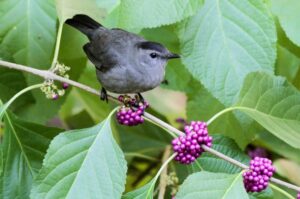
American beautyberry is very important for the local wildlife; cattle enjoy the twigs and leaves in the winter and twigs in the winter. Additionally, the fruit is important for over forty types of songbirds including the American Robin, Brown Thrasher, Purple Finch, and Eastern Towhee. The drupes/clusters are eaten by armadillo, foxes, opossum, raccoon, and squirrels. Additionally, white tailed deer consume the fruit in the fall after leaves drop. They also browse the leaves in summer when highly preferred foods are not available.
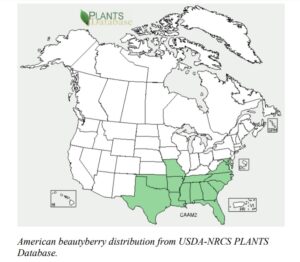 Bunchberry is also used for botanical home remedies. For instance, the roots, leaves, and branches were used by various Native American tribes for medicinal purposes to treat malarial fevers and rheumatism. The roots were used to treat dizziness, stomachaches and dysentery. Roots and berries were boiled and drunk to treat colic. The leaves can be crushed and stuffed in pockets or under hats to repel mosquitoes. Studies conducted by the Agricultural Research Service has shown two compounds – callicarpenal and intermedeol – are responsible for the repellant effect.
Bunchberry is also used for botanical home remedies. For instance, the roots, leaves, and branches were used by various Native American tribes for medicinal purposes to treat malarial fevers and rheumatism. The roots were used to treat dizziness, stomachaches and dysentery. Roots and berries were boiled and drunk to treat colic. The leaves can be crushed and stuffed in pockets or under hats to repel mosquitoes. Studies conducted by the Agricultural Research Service has shown two compounds – callicarpenal and intermedeol – are responsible for the repellant effect.
Panhandle Flower Spotlight
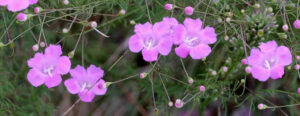 False Foxglove is named for the appearance of their brilliant pink flowers which bear a resemblance to the northern favorite Foxglove. False Foxglove actually covers a collection of closely related parasitic plants that are difficult to distinguish by all but the keenest of botanists. False Foxglove is an unusual and important Florida native plant that explodes into beautiful, vibrantly colored flowers of light purple to pink from September to December.
False Foxglove is named for the appearance of their brilliant pink flowers which bear a resemblance to the northern favorite Foxglove. False Foxglove actually covers a collection of closely related parasitic plants that are difficult to distinguish by all but the keenest of botanists. False Foxglove is an unusual and important Florida native plant that explodes into beautiful, vibrantly colored flowers of light purple to pink from September to December.
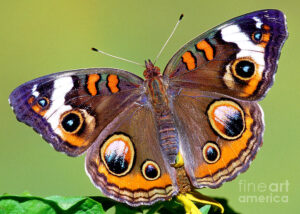
This species plays important ecological roles in Florida’s natural areas. The tubular flowers are the preferred nectar source for the larger-sized native solitary and bumble bees present in the Panhandle, although all manner of bees and butterflies will also visit. Additionally, False Foxglove is the primary host plant for the unique Common Buckeye butterfly. Common Buckeye larvae (caterpillars) feed on False Foxglove foliage during the summer before emerging as adults.
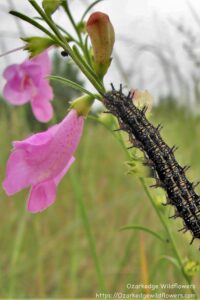 False Foxglove is an important indicator of a healthy native ecosystem. As a parasitic plant, False Foxglove obtains nutrients and energy by photosynthesis AND by using specialized roots to tap into the roots of nearby suitable hosts (native grasses and other plants). As both False Foxglove and its parasitic host plants prefer to grow in the sunny, fire-exposed pine flatwoods and sand ridges that characterized the natural pre-settlement Florida, an area with an abundance of False Foxglove in flower is likely in good ecological shape! A perfect example of this is Torreya State Park, an area that explodes in beautiful fall foliage around September.
False Foxglove is an important indicator of a healthy native ecosystem. As a parasitic plant, False Foxglove obtains nutrients and energy by photosynthesis AND by using specialized roots to tap into the roots of nearby suitable hosts (native grasses and other plants). As both False Foxglove and its parasitic host plants prefer to grow in the sunny, fire-exposed pine flatwoods and sand ridges that characterized the natural pre-settlement Florida, an area with an abundance of False Foxglove in flower is likely in good ecological shape! A perfect example of this is Torreya State Park, an area that explodes in beautiful fall foliage around September.
Native Wildflowers of Florida
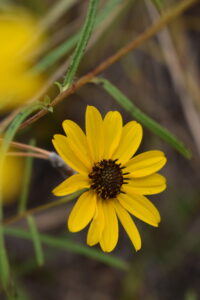
The Florida Wildflower Foundation defines “Florida native wildflowers” as any flowering herbaceous species that grew wild within the state’s natural ecosystems in the 1560s; this is when Florida’s first botanical records were created. The defenition also recognizes natives as flowering plants and grasses introduced before that time by Native Americans through travel and trade, as well as wildflowers introduced without aid of human intervention. Native wildflowers are crucial for the health of the variety of ecosystems found in Florida; if you want to see a plethora of wildlife and beautiful blooms, plant native! Spring and fall are the time for showy fields of wildflowers but Florida also boosts beautiful summer blooms such as meadowbeauty and hibiscus.
Please don’t pick wildflowers! Preserve your memories with a picture, art, or the written word – it will last much longer. Picking flowers reduces a plants’ ability to sustain itself and grow back stronger the next season. Additionally, picking the flowers of endangered or threatened species is illegal (see Florida Statute 581.185 Preservation of native flora of Florida). Want to spread the natural beauty of the Sunshine State? Send your photos to photos@flawildflowers.org.
Beach Ecology Walk
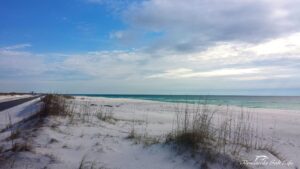 Healthy Gulf is hosting a beach ecology walk on Tuesday, January 11th at 9 AM. The walk will be along the beach of Santa Rosa Island at Pensacola Beach. The hike will follow along both the Gulf and Sound side of the Island, exploring the changing plant communities and life along the shoreline. The host of the walk will teach attendees about terrestrial and aquatic life by examining what has washed ashore. The hike will cover a total of four miles and will take two hours to complete. The exact meeting location will be provided only upon registration for the event, although it is free. However, space is limited so to ensure a spot, email christian@healthygulf.org or call (850) 687-9968 to reserve your spot today!
Healthy Gulf is hosting a beach ecology walk on Tuesday, January 11th at 9 AM. The walk will be along the beach of Santa Rosa Island at Pensacola Beach. The hike will follow along both the Gulf and Sound side of the Island, exploring the changing plant communities and life along the shoreline. The host of the walk will teach attendees about terrestrial and aquatic life by examining what has washed ashore. The hike will cover a total of four miles and will take two hours to complete. The exact meeting location will be provided only upon registration for the event, although it is free. However, space is limited so to ensure a spot, email christian@healthygulf.org or call (850) 687-9968 to reserve your spot today!
New Cave Discovered at Florida Caverns
There has been an amazing new discovery at the beloved Florida Caverns State Park. A MASSIVE new cave has been discovered. Called the New Cave, or Liz’s Surprise, it is reconceptualizing what experts know about Florida caves.
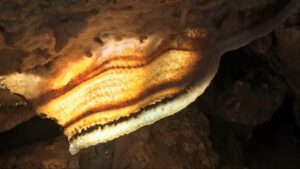
The cave is the third-longest cave in Florida at 5576ft, although exploration is still underway. The cave entrance was found approximately 25ft underground on the newly acquired parkland called Bennett Parcel. So far they have not found evidence of humans in the cave but there is a plethora of wildlife, fascinating formations, and crawlways.
Visit the recently published Florida Caverns State Park Youtube video to see the new discovery for yourself or consider visiting the park for a guided cave tour!